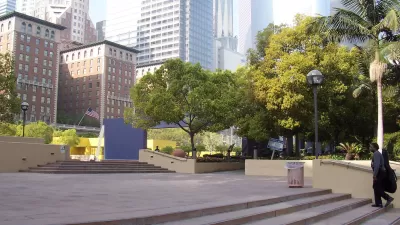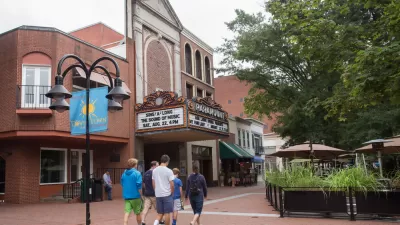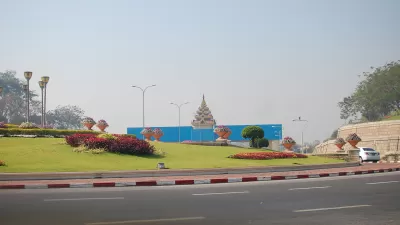Freeway overpasses instead of town squares are now often selected as the preferred public space to promote a non-commercial point of view, but such messaging does little to enhance public discourse, writes planner and urbanist Howard Blackson.
Towns used to be built around public squares, which became the center and podium for all manner of public discourse. Later, buildings came first and public space became an after-thought. Worse yet, now freeway overpasses rather than public squares or plazas are often selected as the place to protest and pontificate about a political or social belief. Planner, urbanist, and Leon Krier disciple, Howard Blackson writes about this less obvious loss to an auto-oriented lifestyle:
Our failure to cultivate the value and quality of our public spaces and public life is found in this picture of protesters and political advocates on a freeway overpass. Our cities are made up of public buildings, streets, squares and private lots, blocks and buildings. But when people want to be heard, seen, and get their message out to as many people as possible, they now gather on freeway bridge overpasses… for its on the freeways where everyone else can be found today, and not on our public street corners and squares.
Blackson goes on to point out how freeway overpasses are not the equals of urban public spaces:
When I see people expressing their views on freeway overpasses, I see our civilization under duress or at least in transition – from gathering in the square to holding signs on an overpass bridge. These are one-way statements and this type of conversation does not facilitate a dialog and understanding. Sadly, this illustrates how far we’ve receded from what urban design guru Leon Krier teaches, “The architecture of the city and public space is a matter of common concern to the same degree as laws and language – they are the foundation of civility and civilization.”
For more of Blackson's thoughts on this topic, see the source article.
FULL STORY: Overpassing the value of public space

Study: Maui’s Plan to Convert Vacation Rentals to Long-Term Housing Could Cause Nearly $1 Billion Economic Loss
The plan would reduce visitor accommodation by 25,% resulting in 1,900 jobs lost.

North Texas Transit Leaders Tout Benefits of TOD for Growing Region
At a summit focused on transit-oriented development, policymakers discussed how North Texas’ expanded light rail system can serve as a tool for economic growth.

Using Old Oil and Gas Wells for Green Energy Storage
Penn State researchers have found that repurposing abandoned oil and gas wells for geothermal-assisted compressed-air energy storage can boost efficiency, reduce environmental risks, and support clean energy and job transitions.

Santa Barbara Could Build Housing on County Land
County supervisors moved forward a proposal to build workforce housing on two county-owned parcels.

San Mateo Formally Opposes Freeway Project
The city council will send a letter to Caltrans urging the agency to reconsider a plan to expand the 101 through the city of San Mateo.

A Bronx Community Fights to Have its Voice Heard
After organizing and giving input for decades, the community around the Kingsbridge Armory might actually see it redeveloped — and they want to continue to have a say in how it goes.
Urban Design for Planners 1: Software Tools
This six-course series explores essential urban design concepts using open source software and equips planners with the tools they need to participate fully in the urban design process.
Planning for Universal Design
Learn the tools for implementing Universal Design in planning regulations.
Ascent Environmental
Borough of Carlisle
Institute for Housing and Urban Development Studies (IHS)
City of Grandview
Harvard GSD Executive Education
Toledo-Lucas County Plan Commissions
Salt Lake City
NYU Wagner Graduate School of Public Service





























